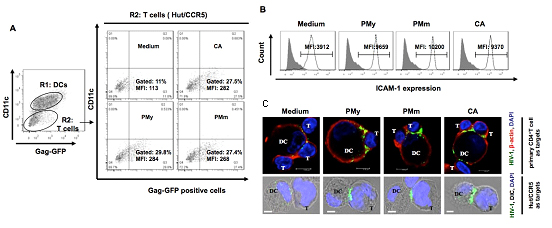Penicillium marneffei (P. marneffei) is considered an indicator pathogen of AIDS, and the endemicity and clinical features of P. marneffei have been described. While, how the co-infection of P. marneffei exacerbate deterioration of the immune response remains poorly understood.
Professor WANG Jianhua at the Institute Pasteur of Shanghai, Chinese Academy of Sciences and his team recently discovered that dendritic cells (DCs) could be activated by both thermally dimorphic forms of P. marneffei for significantly promoting HIV-1 trans-infection of CD4+ T cells. Moreover, they found that P. marneffei-stimulated DCs efficiently activated resting CD4+ T cells and induced more susceptible targets for viral infection. This finding demonstrates that DC function and its interaction with HIV-1 have been modulated by opportunistic pathogens such as P. marneffei for viral dissemination and infection amplification, highlighting the importance of understanding DC-HIV-1 interaction for viral immunopathogenesis elucidation.
These results have been published online in PLoS ONE, in Nov, 2011. This project was conducted in collaboration with the First Affiliated Hospital of Kunming Medical College, et al, and supported by grants from CAS, Natural Science Foundation of China and Shanghai.

Figure: A, The increased HIV-1 transfer mediated by fungi-stimulated DCs.
B. The upregulated ICAM-1 expression on fungi-stimulated DCs.
C. The enhanced virological synapses formed between fungi-stimulated DCs with T cells.
B. The upregulated ICAM-1 expression on fungi-stimulated DCs.
C. The enhanced virological synapses formed between fungi-stimulated DCs with T cells.

